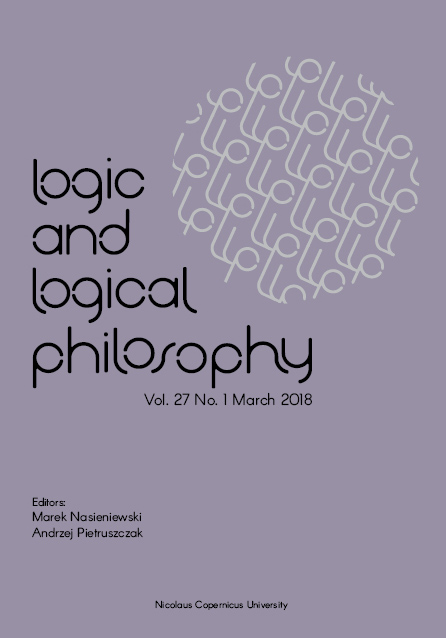The Cumulative Force of Analogies
DOI:
https://doi.org/10.12775/LLP.2017.011Keywords
aarguments by analogy, a priori analogy, deductivism, complex analogies, inferential strengthAbstract
In this paper I will argue that most objections to deductive analyses of a priori analogies are incorrect, often involve basic misinterpretations of what the deductive reconstruction of those arguments are saying, and sometimes also betray a confusion about what part of the reasoning corresponds to the analogical inference. In particular, I will be focusing on a raft of objections made by Juthe in [2015] and subject his alternative views to criticism.
I will then argue that Juthe does implicitly have a good argument against deductivism: adding further analogues seems to have a cumulative force that they would not have on a deductivist analysis. This is so not only in ordinary analogical arguments but, perhaps surprisingly, with a priori analogical arguments. I will then argue that this does not favor a sui generis view of the analogical argument over inductivist views, and attempt to show that a confirmation-theoretic approach to analogical inference makes the best sense of our intuitions about the strength of analogical arguments.
References
Bermejo-Luque, L, “Deduction without dogmas: The case of moral analogical argumentation”, Informal Logic 34, 3 (2014): 311–336. DOI: 10.22329/il.v34i3.4112
Botting, D., “Deductivism without detachment”, Cogency 4, 2 (2012a): 9–24.
Botting, D., “The paradox of analogy”, Informal Logic 32, 1 (2012b): 98–115. DOI: 10.22329/il.v32i1.3143
Chisholm, R., The Problem of the Criterion, Milwaukee: Marquette University Press, 1973.
Freeman, J., “Govier’s distinguishing a priori from inductive arguments by analogy: Implications for a general theory of ground adequacy”, Informal Logic 33, 2 (2013): 175–194. DOI: 10.22329/il.v33i2.3893
Govier, T., Problems in Argument Analysis and Evaluation, Dordrecht: Foris Publishing, 1987.
Govier, Trudy, “Analogies and missing premises”, Informal Logic 11, 3 (1989).
Govier, T., “Should a priori analogies be regarded as deductive arguments?”, Informal Logic 22, 2 (2002): 155–157.
Guarini, M., “A defense of non-deductive reconstructions of analogical arguments”, Informal Logic 24, 2 (2004): 153–168. DOI: 10.22329/il.v24i2.2141
Juthe, A., “Arguments by analogy”, Argumentation 19, 1 (2005): 1–27. DOI: 10.1007/s10503-005-2314-9
Juthe, A. “A systematic review of classifications of argument by analogy”, pages pp.109–127, Chapter 7, in H. Ribeiro (ed.), Systematic approaches to argument by analogy, Argumentation Library, Heidelberg, New York, Dordrecht, London: Springer, 2014. DOI: 10.1007/978-3-319-06334-8_7
Juthe, A., “Analogical argumentation schemes and complex argumentation”, Informal Logic 35, 3 (2015): 378–445. DOI: 10.22329/il.v35i3.4211
Kraus, M., “Arguments by analogy (and what we can learn about them from Aristotle)”, pages 171–182, Chapter 13, in van Eemeren, Garssen (eds.) Reflections on Theoretical Issues in Argumentation Theory, Argumentation Library, Heidelberg, New York, Dordrecht, London: Springer, 2015. DOI: 10. 1007/978-3-319-21103-9_13
Shecaira, F.P., “Analogical inference in ethics and law: A defence of a deductivist analysis”. Informal Logic 33, 3 (2013): 406–437. DOI: 10.22329/il.v33i3.3778
Tomić, T., “False dilemma: A systematic exposition”, Argumentation 27, 4 (2013): 347–368. DOI: 10.1007/s10503-013-9292-0
Tropman, E., “Intuitionism and the secondary-quality analogy in ethics”, Journal of Value Inquiry 44, 1 (2010): 31–45. DOI: 10.1007/s10790-009-9173-9
Waller, B., “Classifying and analyzing analogies”, Informal Logic 21, 3 (2001): 199–218. DOI: 10.22329/il.v21i3.2246
Wreen, M., “A second form of argument from analogy”, Theoria 73, 3 (2007): 221–239. DOI: 10.1111/j.1755-2567.2007.tb01201.x
Downloads
Published
How to Cite
Issue
Section
Stats
Number of views and downloads: 845
Number of citations: 1







